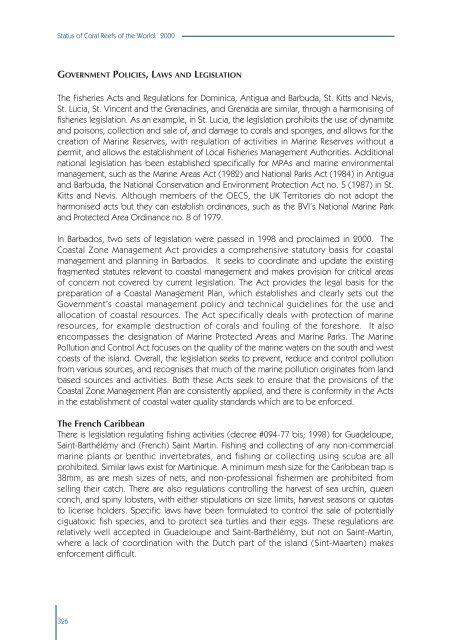Status of Coral Reefs of the World 2000
Status of Coral Reefs of the World 2000.pdf
Status of Coral Reefs of the World 2000.pdf
- No tags were found...
You also want an ePaper? Increase the reach of your titles
YUMPU automatically turns print PDFs into web optimized ePapers that Google loves.
<strong>Status</strong> <strong>of</strong> <strong>Coral</strong> <strong>Reefs</strong> <strong>of</strong> <strong>the</strong> <strong>World</strong>: <strong>2000</strong><br />
GOVERNMENT POLICIES, LAWS AND LEGISLATION<br />
The Fisheries Acts and Regulations for Dominica, Antigua and Barbuda, St. Kitts and Nevis,<br />
St. Lucia, St. Vincent and <strong>the</strong> Grenadines, and Grenada are similar, through a harmonising <strong>of</strong><br />
fisheries legislation. As an example, in St. Lucia, <strong>the</strong> legislation prohibits <strong>the</strong> use <strong>of</strong> dynamite<br />
and poisons, collection and sale <strong>of</strong>, and damage to corals and sponges, and allows for <strong>the</strong><br />
creation <strong>of</strong> Marine Reserves, with regulation <strong>of</strong> activities in Marine Reserves without a<br />
permit, and allows <strong>the</strong> establishment <strong>of</strong> Local Fisheries Management Authorities. Additional<br />
national legislation has been established specifically for MPAs and marine environmental<br />
management, such as <strong>the</strong> Marine Areas Act (1982) and National Parks Act (1984) in Antigua<br />
and Barbuda, <strong>the</strong> National Conservation and Environment Protection Act no. 5 (1987) in St.<br />
Kitts and Nevis. Although members <strong>of</strong> <strong>the</strong> OECS, <strong>the</strong> UK Territories do not adopt <strong>the</strong><br />
harmonised acts but <strong>the</strong>y can establish ordinances, such as <strong>the</strong> BVI’s National Marine Park<br />
and Protected Area Ordinance no. 8 <strong>of</strong> 1979.<br />
In Barbados, two sets <strong>of</strong> legislation were passed in 1998 and proclaimed in <strong>2000</strong>. The<br />
Coastal Zone Management Act provides a comprehensive statutory basis for coastal<br />
management and planning in Barbados. It seeks to coordinate and update <strong>the</strong> existing<br />
fragmented statutes relevant to coastal management and makes provision for critical areas<br />
<strong>of</strong> concern not covered by current legislation. The Act provides <strong>the</strong> legal basis for <strong>the</strong><br />
preparation <strong>of</strong> a Coastal Management Plan, which establishes and clearly sets out <strong>the</strong><br />
Government’s coastal management policy and technical guidelines for <strong>the</strong> use and<br />
allocation <strong>of</strong> coastal resources. The Act specifically deals with protection <strong>of</strong> marine<br />
resources, for example destruction <strong>of</strong> corals and fouling <strong>of</strong> <strong>the</strong> foreshore. It also<br />
encompasses <strong>the</strong> designation <strong>of</strong> Marine Protected Areas and Marine Parks. The Marine<br />
Pollution and Control Act focuses on <strong>the</strong> quality <strong>of</strong> <strong>the</strong> marine waters on <strong>the</strong> south and west<br />
coasts <strong>of</strong> <strong>the</strong> island. Overall, <strong>the</strong> legislation seeks to prevent, reduce and control pollution<br />
from various sources, and recognises that much <strong>of</strong> <strong>the</strong> marine pollution originates from land<br />
based sources and activities. Both <strong>the</strong>se Acts seek to ensure that <strong>the</strong> provisions <strong>of</strong> <strong>the</strong><br />
Coastal Zone Management Plan are consistently applied, and <strong>the</strong>re is conformity in <strong>the</strong> Acts<br />
in <strong>the</strong> establishment <strong>of</strong> coastal water quality standards which are to be enforced.<br />
The French Caribbean<br />
There is legislation regulating fishing activities (decree #094-77 bis; 1998) for Guadeloupe,<br />
Saint-Barthélémy and (French) Saint Martin. Fishing and collecting <strong>of</strong> any non-commercial<br />
marine plants or benthic invertebrates, and fishing or collecting using scuba are all<br />
prohibited. Similar laws exist for Martinique. A minimum mesh size for <strong>the</strong> Caribbean trap is<br />
38mm, as are mesh sizes <strong>of</strong> nets, and non-pr<strong>of</strong>essional fishermen are prohibited from<br />
selling <strong>the</strong>ir catch. There are also regulations controlling <strong>the</strong> harvest <strong>of</strong> sea urchin, queen<br />
conch, and spiny lobsters, with ei<strong>the</strong>r stipulations on size limits, harvest seasons or quotas<br />
to license holders. Specific laws have been formulated to control <strong>the</strong> sale <strong>of</strong> potentially<br />
ciguatoxic fish species, and to protect sea turtles and <strong>the</strong>ir eggs. These regulations are<br />
relatively well accepted in Guadeloupe and Saint-Barthélémy, but not on Saint-Martin,<br />
where a lack <strong>of</strong> coordination with <strong>the</strong> Dutch part <strong>of</strong> <strong>the</strong> island (Sint-Maarten) makes<br />
enforcement difficult.<br />
326
















